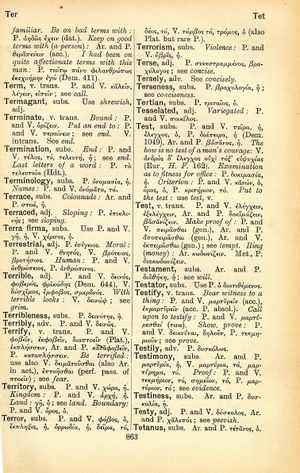testator: Difference between revisions
κακοὶ μάρτυρες ἀνθρώποισιν ὀφθαλμοὶ καὶ ὦτα βαρβάρους ψυχὰς ἐχόντων → eyes and ears are poor witnesses for men if their souls do not understand the language (Heraclitus Phil.: Fr. B 107; Testimonia: Fragment 16, line 6)
(3) |
m (Woodhouse1 replacement) |
||
| Line 1: | Line 1: | ||
{{Woodhouse1 | {{Woodhouse1 | ||
|Text=[[File:woodhouse_863.jpg|thumb|link={{filepath:woodhouse_863.jpg}}]] | |Text=[[File:woodhouse_863.jpg|thumb|link={{filepath:woodhouse_863.jpg}}]] | ||
===substantive=== | |||
Use P. ὁ διατιθέμενος. | Use [[prose|P.]] ὁ [[διατιθέμενος]]. | ||
}} | }} | ||
{{Lewis | {{Lewis | ||
Revision as of 09:24, 20 May 2020
English > Greek (Woodhouse)
substantive
Use P. ὁ διατιθέμενος.
Latin > English (Lewis & Short)
testātor: ōris, m. testor.
I One who bears witness or testifies to a thing, a witness (very rare), Prud. Cath. 12, 85.—
II One who makes a will or testament, a testator (the predom. jurid. signif. of the word, but not in Cic.), Dig. 28, 3, 17; 31, 1, 89; Suet. Ner. 17; Lact. 4, 20 al.
Latin > French (Gaffiot 2016)
testātŏr,¹⁶ ōris, m. (tester),
1 celui qui rend témoignage : Prud. Cath. 12, 87
2 testateur : Suet. Nero 17 ; Dig. 38, 3, 17.
Latin > German (Georges)
tēstātor, ōris, m. (testor), I) der Zeuge, Prud. cath. 12, 87. – II) der Testierer, Testator, Suet. u.a.
Latin > English
testator testatoris N M :: testator; one who makes a will; witness, one who testifies (L+S)

